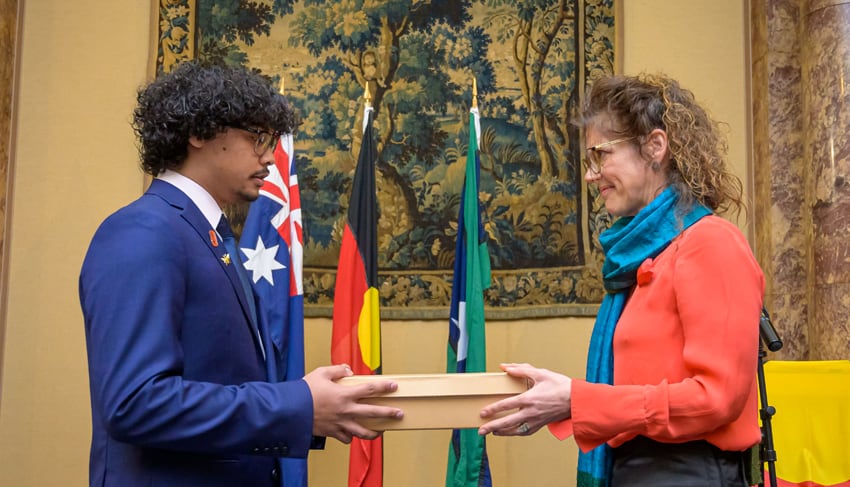
Return of 43 ceremonial and sacred objects to Aboriginal communities
Manchester Museum became the first museum in Europe to unconditionally return 43 secret, sacred and ceremonial material to communities of origin.
The return was arranged as part of the Australian Institute of Aboriginal and Torres Strait Islander Studies’ (AIATSIS) project, funded by the Australian government, called the Return of Cultural Heritage (RoCH) project.
This project was timed to coincide with the 250th anniversary of James Cook’s first voyage to the east coast of Australia and the beginning of the large-scale removal of Aboriginal and Torres Strait Islander cultural heritage to overseas collections.
AIATSIS is an Australian government statutory authority focused exclusively on the diverse history, cultures and heritage of Aboriginal and Torres Strait Islander Australia. The RoCH project aimed to facilitate and secure the return of Aboriginal and Torres Strait Islander cultural heritage materials, to document relevant material held by overseas collecting institutions and to build relationships between those institutions, AIATSIS and Aboriginal and Torres Strait Islander communities.
As a component of this project, AIATSIS contacted Manchester Museum, which is part of the University of Manchester. The Museum’s collections include a number of objects which had originally belonged to various Australian Indigenous communities but which had been part of the collections since the 1920s. The initial request was for data sharing but also asked if Manchester would consider a return request from communities.
At the time of the request, Manchester Museum’s collection policy did not specifically set down a procedure for the repatriation of sacred or ceremonial items. The Museum’s Director, Esme Ward, took the view that the focus of museums should be upon people and their relationship to collections. She liaised with AIATSIS who facilitated the negotiations on behalf of Aboriginal and Torres Strait Islander Nations. AIATSIS led the return process, working with Manchester Museum on provenance research and undertaking the extensive community engagement required to prepare the return request. Ward said, “By taking this action Manchester Museum will become more inclusive, caring and relevant to the communities it serves both locally and globally.” This approach mirrored the attitude of the University of Manchester, where great emphasis is placed upon the importance of social responsibility.
The extensive and time-consuming research to understand the provenance of the objects was not only conducted by Manchester and AIATSIS staff through museum documentation and other archival records, but also through the engagement with named communities to draw upon the knowledge of Traditional Owners and custodians. Using the ‘ask first’ principles, it was ultimately community Elders who determined which objects would be the subject of the return request. This information could then be presented to the University of Manchester’s Board of Governors, which greatly assisted the Board in coming to a prompt and unanimous decision to approve the unconditional repatriation of 43 collection items to the Aranda People of Central Australia, the Gangalidda and Garawa Peoples of north west Queensland, the Nyamal People of the Pilbara and the Yawuru People of Broome. It was the first time Manchester Museum had repatriated sacred or ceremonial materials, rather than human (ancestral) remains.
In late November 2019, a live-streamed formal handover ceremony took place at Australia House, London, with delegates from Gangalidda Garawa and AIATSIS acting on behalf of Nyamal along with dignitaries, university staff and museum professionals. ‘The repatriation of our sacred cultural heritage items is a fundamental part of the healing and reconciliation process, both within our communities and between our mob and the Government,’ Mangubadijarri Yanner, Representative for the Gangalidda and Garawa Native Title Aboriginal Corporation said. ‘Bringing these sacred cultural heritage items back to Country is important and necessary for the purpose of cultural revitalisation – because locked deep within these items is our lore; our histories, our traditions, our livelihoods and our stories.’
A key characteristic of the process was transparency at every stage. This reassured communities that the museum was acting in good faith and ensured the museum could have confidence that the request was coming from those with the knowledge and authority to do so. Key documents will be made publicly available where appropriate and only with the permission of communities. Knowledge pertaining to the secret sacred materials was not included.
AIATSIS and the University of Manchester have signed a Memorandum of Understanding encompassing a commitment from both parties to collaborate and share knowledge on how to manage collections which include items related to Aboriginal and Torres Strait Islander communities. This commitment typifies all aspects of the repatriation, which focused on the wealth of mutual understanding and knowledge to be gained from a collaborative enterprise approached with care and sensitivity on all sides.